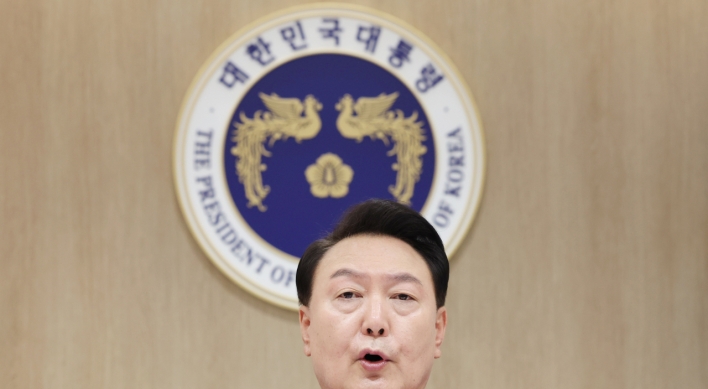South Korea reported no additional cases of Middle East respiratory syndrome for the seventh consecutive day Sunday, while hospitals resumed services and amusement parks and movie theaters saw a significant rise in visitors, showing signs that the outbreak is almost over.
Once the outbreak is officially over, sources said Health Minister Moon Hyung-pyo, who has been criticized for his handling of the health crisis, is likely to be replaced.
The MERS outbreak has killed 36 and infected 186 since the index case was reported on May 20. The spread has consistently shown signs of losing steam lately, with no additional cases confirmed since July 6. If no new cases are reported until Aug. 2 -- four weeks after the latest case was reported on July 5 -- it can be announced that the outbreak in the country is over.
Once the outbreak is officially over, sources said Health Minister Moon Hyung-pyo, who has been criticized for his handling of the health crisis, is likely to be replaced.
The MERS outbreak has killed 36 and infected 186 since the index case was reported on May 20. The spread has consistently shown signs of losing steam lately, with no additional cases confirmed since July 6. If no new cases are reported until Aug. 2 -- four weeks after the latest case was reported on July 5 -- it can be announced that the outbreak in the country is over.

A total of 125 out of 186 MERS patients have recovered from the disease and been discharged from hospitals. A number of medical facilities that have been shut down, including Pyeongtaek St. Mary’s Hospital and Hallym University Medical Center, have resumed their services.
All schools nationwide have been on their normal schedule since July 6.
According to the Korea Film Council, 2.29 million people visited movie theaters from July 4-5, almost double the 1.2 million who went in same period last month.
The number of visitors to Everland, one of the most popular amusement parks in the country, also increased significantly in the first week of July. Some 68,000 Koreans visited the park earlier this month, while the park only received about 29,000 in the first weekend of June.
“We are discussing with local and foreign experts when and how we are going to declare the end of the MERS outbreak,” said Jeong Eun-kyung from the Health Ministry.
The outbreak, however, dramatically affected the everyday lives of Koreans and the nation’s economy last month, as many avoided crowded and public spaces including shopping malls and public transportation. Almost 3,000 schools nationwide were shut down to prevent possible infection on June 12.
Last week, the Bank of Korea forecast that the economic growth rate this year would slow to around 2.8 percent, down from 3.3 percent last year, citing the MERS outbreak as one of the biggest burdens.
The outbreak also had an impact on the country’s $30 billion tourism industry, as more than 124,000 tourists, most of them from China, last month canceled their trips to Korea.
The Ministry of Culture, Sports and Tourism estimates that the number of foreign visitors last month dropped by 24 percent from the same period last year.
The Health Ministry, led by Minister Moon, has been on the hot seat since the early stages of the outbreak, especially for trying to keep details about the crisis from the public.
The government had refused to share the list of MERS-affected hospitals for 18 days after the first case was confirmed in late May.
The lack of transparency has been blamed for the public fear that eventually damaged the country’s economy. The ministry has also been accused of protecting the hospitals’ commercial interests by not sharing the information, rather than keeping the general public safe from the possible infection.
President Park Geun-hye, who made her first on-site visit to meet medical staff more than two weeks after the first MERS case was confirmed, said last month that there were a number of problems with the government’s initial handling of the outbreak -- indirectly criticizing Moon’s leadership.
Minister Moon also publicly said last month that he was willing to take the responsibility for the ministry’s faults in handling the outbreak while speaking at the National Assembly.
“It’s likely that Moon will be replaced by someone else once the outbreak is officially over,” a Cheong Wa Dae official was anonymously quoted as saying in news reports.
Moon, a former senior economist at the state-run think-tank Korea Development Institute, was appointed as the Minister of Health and Welfare in December 2013 -- mainly to carry out President Park’s controversial civil service pension reforms.
He completed the task in May, when the parliament approved reductions in annuities to former government employees. Ever since the MERS-outbreak hit the nation, Moon has been criticized for his lack of expertise in the field of public health, questioning whether or not he deserved to be in the post in the first place.
By Claire Lee (dyc@heraldcorp.com)


















